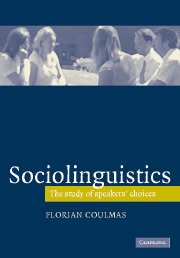1 - Introduction: notions of language
Published online by Cambridge University Press: 05 June 2012
Summary
Reality does not speak to us objectively, and no scientist can be free from constraints of psyche and society.
Stephen Jay Gould (2000)Natural language and social language
As human beings we are able to change our behaviour. The idea that we act as free agents is fundamental to our self-conception. Every word we say reinforces this conviction, for whenever we speak we make choices. The ability to consider alternatives and opt for one is basic to intelligent life. It is restricted by our physical nature, the many things we cannot choose, such as the colour of our eyes, our IQ, or whether we are beautiful or ugly. All this may change soon, as the human species gets ready to do with itself what it has done with other species for a long time: interfere with nature's course, select, breed, grow and artificially manipulate their genetic makeup. The life sciences have made spectacular progress over the past several decades, constantly expanding the realm of culture – that which we control – at the expense of nature – that which controls us. No longer confined to science fiction novels, anthropotechnology has crossed the threshold into the real world and become a vital concern of legislation, the paradigm of deliberate regulation of behaviour. The prospects are tempting. Before long, we are told, we will be able to safeguard our offspring against congenital diseases, if not secure immortality for ourselves.
- Type
- Chapter
- Information
- SociolinguisticsThe Study of Speakers' Choices, pp. 1 - 14Publisher: Cambridge University PressPrint publication year: 2005

